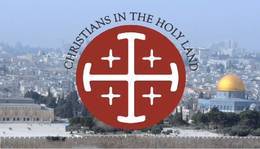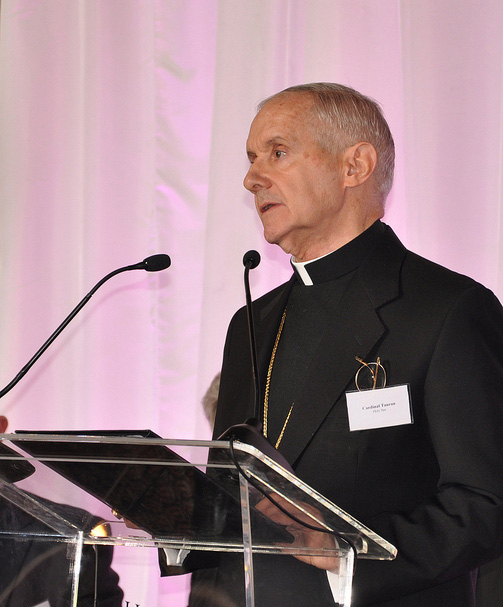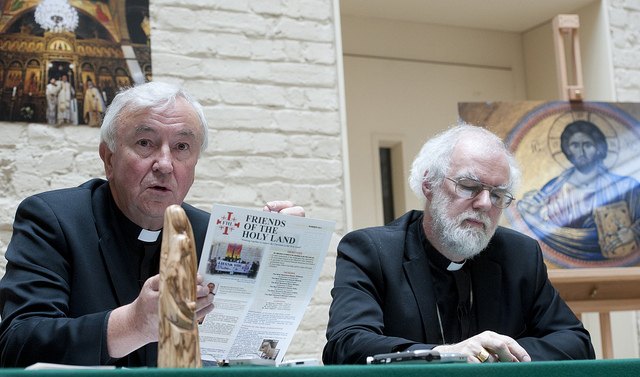Conference on Christians in the Holy Land - speeches from the second day

Thursday 21st July 2011
The following speeches are a selection of those made on the second day of the Conference on Christians in the Holy Land, and include an audio recording of the Archbishops' comments at the concluding press conference.
Lord Howell
 Lord Howell, Minister of State (Foreign & Commonwealth Office) spoke about the government's commitment to defending and protecting the rights of religious minorities, saying that "freedom of belief is central to our foreign policy". Among other issues, he also discussed the practical problems faced by Palestinians with the restriction of movement and the difficulties they had in obtaining permits and how some families were forced to live apart: "The UK government has lobbied the Israelis hard on the issue of movement and access and we will continue to do so".
Lord Howell, Minister of State (Foreign & Commonwealth Office) spoke about the government's commitment to defending and protecting the rights of religious minorities, saying that "freedom of belief is central to our foreign policy". Among other issues, he also discussed the practical problems faced by Palestinians with the restriction of movement and the difficulties they had in obtaining permits and how some families were forced to live apart: "The UK government has lobbied the Israelis hard on the issue of movement and access and we will continue to do so".
Listen to Lord Howell's speech [15Mb] or read a transcript
Cardinal Tauran
 Cardinal Jean-Louis Tauran (Representative of His Holiness Pope Benedict XVI, President, Pontifical Council for Interreligious Dialogue) gave an illuminating talk in which he outlined the enormous significance of Christians in the region, describing them as 'apostolic Christians'. He said "Those communities have been built on the faith of the apostles. They are apostolic communities in the deepest sense of the word. Their practice comes through the faith of the apostles; this is their identity.... Arab Christians are a gift to the societies because they bring cultural openness, a sense of the dignity of the human person and particularly of women; a conception of freedom which harmonizes rights and privileges and a conception of political society which can lead to democracy."
Cardinal Jean-Louis Tauran (Representative of His Holiness Pope Benedict XVI, President, Pontifical Council for Interreligious Dialogue) gave an illuminating talk in which he outlined the enormous significance of Christians in the region, describing them as 'apostolic Christians'. He said "Those communities have been built on the faith of the apostles. They are apostolic communities in the deepest sense of the word. Their practice comes through the faith of the apostles; this is their identity.... Arab Christians are a gift to the societies because they bring cultural openness, a sense of the dignity of the human person and particularly of women; a conception of freedom which harmonizes rights and privileges and a conception of political society which can lead to democracy."
Listen to Cardinal Tauran's speech [12Mb] or read a transcript.
John Dalli
 John Dalli, European Commissioner, gave an address in which he discussed the EU’s commitment to the universal right to freedom of religion, as well as justice and equality, saying ‘there can be no real democracy without equality’.
John Dalli, European Commissioner, gave an address in which he discussed the EU’s commitment to the universal right to freedom of religion, as well as justice and equality, saying ‘there can be no real democracy without equality’.
Listen to John Dalli's speech [13Mb] or read a transcript.
Press Conference
At the concluding press conference, the Archbishops reflected on what they had heard over the two days, and talked about future dialogue and practical ways in which they could help vulnerable communities through the Friends of the Holy Land Appeal.
Listen to the two Archbishops at the press conference [12Mb] or read the transcript below.
Archbishop Rowan Williams:
Thank you for coming this afternoon. I’ll begin by giving you a little bit of background to the conference that’s just concluded – a little bit of narrative.
Its origin really lies in visits that both of us have been making in the last couple of years to the Holy Land. Visits which have left us with a very strong sense that the Christian community in the Holy Land needs a higher profile in this country.
And so it seemed right to us that we should try to increase that profile and develop what I think I referred to in the opening yesterday as a more literate and compassionate understanding of the situation of Christians in the Holy Land. Opening out of course on to the whole set of questions around Palestine and Israel but focussing particularly on where Christians are.
In order to have the best kind of conversation possible we cast our net very broadly. We looked for representatives of church leadership not just locally but globally.
The project was very warmly supported by Pope Benedict with whom I discussed it personally during his visit last year. And it has of course the backing of both our churches in this country.
So we drew in Anglican and Roman Catholic representatives from elsewhere in the world. We had somebody from the South African Roman Catholic Bishop’s conference. We had representatives from the United States and Canada and again from both our churches.
We also sought to cast our net broadly in terms of others who were invited. We invited representatives of the Jewish communities both in the Holy Land and here. And we were particularly privileged to have a number of young people from all three faiths of the Holy Land - Jews, Muslims and Christians - who shared their experience with us together sometimes in very moving ways.
I think for both of us the experience of listening to these young people talking about their possible futures was among the most challenging and moving aspects of the last 48 hours.
Naturally there were voices not represented, there were issues not touched upon. We didn’t attempt to offer a comprehensive overview of one of the most complex situations on the face of the globe.
But we wanted this group to set its own agenda – that is to find in its conversation together pointers for action and engagement and advocacy in the near future.
We had in mind a conference which would not just be a talking shop but one which would genuinely emerge with some concrete proposals that could be shared with local Christian communities, in this country particularly, but also elsewhere in the Christian world. Concrete projects which would engage the attention and the energy of parishes and others.
So I’ll hand over at this point to Archbishop Vincent who will want to say a bit more about how that agenda unfolded.
Archbishop Vincent Nichols:
Thank you very much Archbishop Rowan.
The Archbishop very skilfully gave the conference at its beginning not just some objectives but also some important guidance as to the manner in which it could be conducted. And we were all very responsive to his exhortations.
And one of the great characteristics of this conference I think has been the sensitivity, almost the reverence, with which people have spoken and listened to each other. And I think in that way, listening to the different voices - Jewish, Muslim and Christian - this conference has modelled some of the outcome it would like to promote.
So could I for example just share a few of the insights that were offered which have struck me quite personally?
Archbishop Rowan mentioned the presence of a few young people and in many ways it was their testimony that was the most heartfelt. For example one young Palestinian Christian explained to us how it took him quite a while to work out that his identity was not simply Palestinian, not simply Christian, but it was Palestinian Christian. And when he grasped for himself the depth of that identity then he said he realised that he had a mission. That he had a purpose in the land in which he had grown up and to which he had returned.
It was Cardinal Tauran, here representing the Holy See, who gave a much more theological exposition of what that mission would be, and indeed is, for a Christian presence in the Holy Land.
Another point that emerged was for me very helpful. Clearly one of the focuses of our consideration was the phenomena of emigration. The emigration of Christians from, particularly, the Palestinian territories. But it was explained to us that physical emigration is only one kind of emigration. There is also psychological emigration and it’s probably this that then feeds in to religious extremism. And maybe this is something for further consideration – the causes of both kinds of emigration are not that different. So that again, I think, was a very interesting insight in to some of the underlying patterns.
A third point would be the way in which these young people absolutely repudiated the notion, or the identity, as victims. They were repudiating victimhood. They did not want to either think of themselves or have other people think of them as victims. That was refreshing and I believe a real cause for hope.
They described themselves as being, and wanting to be, actors in their own history. And I think anybody who listened to them would have been moved and touched by that. And when they talked about being actors in their own history their vision was one of human dignity, and indeed one of an evolving and strengthening sense of being people of society, members of a civil society, citizens - that was their great hope.
I think there were other strands of thought that are worth noting. Some of the Jewish voices present spoke of the presence of Christians as a moderating influence in the Middle East.
Great emphasis was laid on the theme of hospitality to the stranger which is common to the three faiths who were present, and can be a great source of encouragement once we understand.
So there was a theme going right through this conference that what we want to be in being pro-Christian is also being pro-Israeli and pro-peace. To be pro-Christian means to be in favour of mutual respect of the call of the dignity of every living person. Being-pro Christians means being committed to forgiveness, it means being committed to the notion of peace. And peace cannot be divided; peace must be for everybody in a place. It is indivisible and obviously has to be rooted in justice and forgiveness.
For me the practical outcomes we have to ponder quite carefully, but one theme of the practical outcomes will be very clear. It will be centred round the phrase that we are here to participate in and develop dialogue – mutual understanding through dialogue in the parishes of this country; Anglican, Catholic and maybe in the neighbourhoods of this country. To promote dialogue and develop it in the Holy Land with inter faith activities maybe involving inter faith leaders. Through pilgrimages which quite deliberately engage with communities in the Holy Land. Through diplomatic channels, maybe concentrating on a few quite specific themes. And looking to identify and develop contact with the Palestinian Diaspora as well.
Some of that - much of it - will be focussed on this initiative called ‘Friends of the Holy Land’. You can see it’s not called ‘Friend of the Christians in the Holy Land’ - it’s called ‘Friends of the Holy Land’. It is a movement, a charity, which began a little while ago very quietly, but Archbishop Rowan gave it a very strong launch last week at the General Synod. And it becomes an ecumenical charity through which we hope that in lots of our parishes there will be small groups of people who are committed to being friends of the Holy Land. And it will be a commitment to support the people of the Holy Land in prayer, to inform themselves and to become more aware of the reality of the situation and to offer financial support in very practical ways.
On the brochure that you have it’s as practical as projects for the repair of deteriorating houses. The running and development of a day care centre for the elderly in Bethlehem. ‘Seed corn’ funding for new businesses to provide employment opportunities, in particular youth employment. The distribution of foods and clothes, vouchers, medicines, food parcels, heaters and blankets in winter among those most desperately in need of assistance.
This is something that would touch all the people of the Holy Land particularly in the Palestinian areas, and will be a gesture of practical support from us to them.
They are some of my first impressions both of the quality of the conference itself, its modelling of the way forward and some of the practical steps we can take.
Archbishop Rowan Williams:
If I could just add one last comment before we invite questions.
I think that means that we are looking for a bit of a step change in Christian involvement here with the situation of Christians in the Holy Land. A step change that will allow us to identify and support specific projects more effectively.
And because those are projects not simply for the churches in the Holy Land but for the communities that those churches are embedded in, we don’t see this as an exclusively Christian enterprise, so to speak. For example, this afternoon we heard about a joint housing project which the Catholic Patriarchate in Jerusalem and the Anglican Diocese in Jerusalem are now taking forward. That’s the kind of thing we are looking for more of and want to support.
And a point which came up again and again - or two points perhaps. One was the need for being very specific about the advocacy we undertake on behalf of communities there. That is, we need to have particular aims we want to achieve in talking to governments and NGO’s and so forth. And the second is rethinking how we approach pilgrimage. Making sure that a pilgrimage to the Holy Land is not just a tourist venture but that it engages with the realities on the ground.
And the idea that we night out of this conference perhaps generate almost a new template for what effective pilgrimage to the Holy Land would look like – that’s come into focus, hasn’t it?
Archbishop Vincent Nichols:
Perhaps one other point if I may, because it seems to me very crucial that this afternoon there were obviously questions about where does the group go from now?
For me it was very significant that it was Rabbi Daniel [Sperber], who was present, who really called for a continuation of the work of this group. And that that call came from the Jewish voices present was a very important and significant moment and we’re very grateful for that and very encouraged by it.

